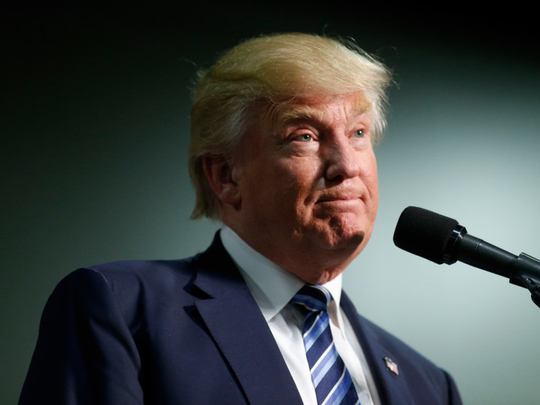
In the hours after People magazine correspondent Natasha Stoynoff said she had been sexually assaulted in 2005 by Donald Trump, the Republican presidential candidate in the United States, while she was interviewing him about his wedding anniversary at his Mar-a-Lago estate, I had the chance to wonder what I, as the magazine’s then-deputy editor, would have done had she told me about Trump’s predation.
For a second there, I imagined a scene of Ben Bradlee-esque [former executive editor of the Washington Post] outrage, calling out the guilty for his behaviour and striking a blow for reporters everywhere. But in reality, I probably would have simply killed the story that Stoynoff had gone to Palm Beach to report. I would have then called Trump’s public relations operatives, told them about their boss’s bad behaviour and agreed to a truce of mutual silence. In the end, few people would have learned of the event, we’d have had to fill a few more pages in the next issue and Trump would have avoided any public embarrassment.
News organisations are devoted to the idea that unless something truly gruesome happens during the course of reporting, the subjects, not the reporters, are the real story. They instinctively feel the pressure to absent themselves from the narrative. It’s the right instinct, but in the case of sexual assault, whose violations are not always visible, reporters face a terrible choice. No wonder Stoynoff didn’t feel able to confide in me or her other editors in 2005. The ghastly truth is that had Trump punched her, our course of action would have been much clearer. Instead, he exploited power, privilege and media sclerosis to his own advantage.
It’s clear that a grim stoicism is the preferred mien at newspapers and magazines. How else to explain covering the Trump campaign, where professionals spend their days accused of dishonesty, duplicity and general disgracefulness, not to mention the taunts of the crowd? Can you imagine enduring that abuse without complaint? In any other job, the human resources department would intervene immediately.
We teach reporters to get the goods, deal with the challenges and accept it, no matter the hurdles. Stoynoff, a pro, had this ethos tattooed on her bones. As an editor with decades of New York City tabloid newspaper and magazine experience, I reinforced that idea every day. Add to that the fear Stoynoff must have felt as a woman concerned about her professional reputation and the stigma attached to sexual assault victims, and the odds were stacked against her ever coming forward. She told only one colleague about the alleged attack. Never mind the potential for Trump’s retaliation, which he tried to mete out this week in suggesting Stoynoff wasn’t attractive enough to be hit on.
The trouble is that this thicket of tradition and fear ends up obscuring the truth about men like Trump. (The story that ran as a result of Stoynoff’s reporting is an anodyne account of Trump’s anniversary, notable only for his lack of interest in his wife’s impending motherhood).
I was always proud of People’s reporting, but we, like all news outlets, had established lanes we were more comfortable to swim in. Pushing Stoynoff to become the story, when Trump was already known as something of a boor, would not have been a priority. If that sounds like a cop-out, there it is.
There are hints of this straitjacket in the debacle of Billy Bush and the Access Hollywood video. I don’t know who knew what when, but I do know NBC News is staffed by professionals. They too don’t want to become the story. They are sensitive to the notion they’re trying to game the presidential race. So when something as toxic as Trump’s hot-mic filth emerged with Bush as enabler, the organisation didn’t deal with it swiftly and decisively. The result is that the Washington Post scooped NBC.
What interests me about journalism’s role in this election goes beyond how news outlets cover Trump. It’s whether they’ll implement systemic changes to prevent staffers from enduring abuse, as Stoynoff allegedly did, while allowing them to do their jobs and to paint honest versions of reality that don’t sacrifice their dignity in the process.
— Washington Post
Larry Hackett is former editor-in-chief of People magazine and a managing partner of 10Ten Media, an editorial content agency.












